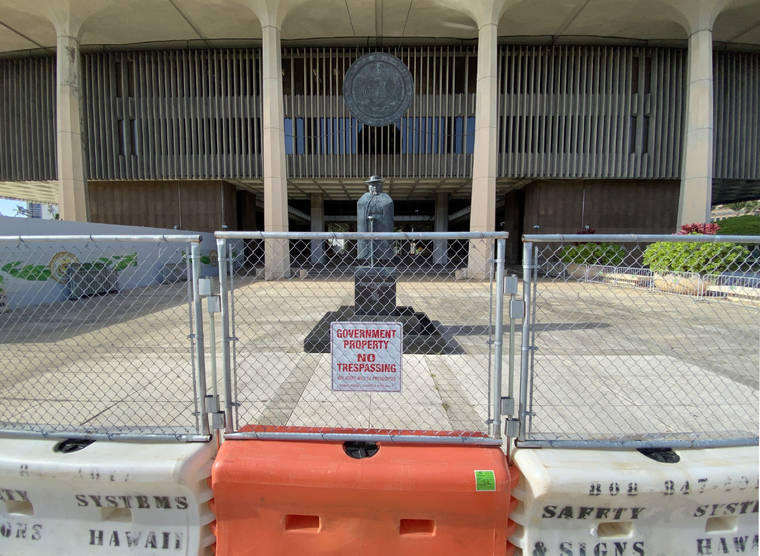The barricades erected to secure the state Capitol building, and the locked doors required by pandemic protocols, are visual reminders of the catastrophic events over the past several months. These are known to lawmakers convening there on Wednesday, and to every Hawaii resident.
But what’s most daunting for legislators convening for the opening of the 2021 session are the unknowns that they now face. The question that confronts them: How can the state pay for the mounting needs of its people, when tax receipts have been running so low?
The answer depends on conditions that remain uncertain, even as lifesaving vaccines bring hope for recovery.
The state has dealt with deep budgetary gaps before, notably in the Great Recession of a decade ago. But the impact of COVID-19 has been even more devastating than that of the global financial crisis of 2008-09. Compounding the public-health disaster that has killed Americans by the thousands, the pandemic has cratered industries and sidelined workers who desperately need those jobs.
Initial forecasts have been grim. In December, Gov. David Ige projected budgetary shortfalls of $1.4 billion annually, for four fiscal years.
At the start of this new year, however, the Council on Revenues forecast somewhat less dire tax receipts in the coming years. And the University of Hawaii Economic Research Organization sees reason for optimism, anticipating that vaccine availability will boost prospects for growth in 2021.
In addition, there is a rosier outlook for aid from the federal government. Lawmakers are hoping some of that can replace the $15 million that usually funds grants-in-aid to nonprofits, one of the many casualties of this recession.
Even so, the Legislature must prepare for a worst-case scenario and make its fiscal plans based on what is known for certain now.
This means that every contingency must remain on the table, up to and including furloughs of public workers. The labor unions argue that members losing even two working days each month will lower consumer spending and hurt the economy, but those near-term, emergency savings from labor costs could be necessary.
Private-sector workers already have borne the brunt of the pandemic recession, to date, and insisting that public workers take part of the burden may be hard to avoid.
That said, House Speaker Scott Saiki and the chamber’s majority leader, state Rep. Della Au Belatti, said in an interview last week that lawmakers are going to pick their way carefully through budgetary discussions, adjusting to changing economic circumstances and the most current data.
Possible tax increases are on the table, too, but that’s a perilous course with the potential of heaping further harm on suffering businesses. Saiki acknowledged the difficulty.
“We do not want to tax ourselves out of this situation,” Saiki said, speaking on the Honolulu Star-Advertiser’s “Spotlight Hawaii” webcast. “If we have to impose taxes, we have to show the public how those funds are going to be used to benefit them.”
Linda Chu Takayama, Ige’s chief of staff, told the House Finance Committee on Tuesday that tax possibilities include a wealth tax and a higher tax on fuel. In general, the aim should be to avoid the broadest-based taxes, such as the general excise tax that is assessed at each transaction stage.
But temporarily pausing certain GET exemptions has been a useful strategy in the past, Saiki said on Tuesday, yielding $400 million.
Some of the other issues expected to arise:
>> Mask mandate enforcement should be strengthened, Saiki said, by passing legislation to make violations punishable by citation and a fine, like a traffic ticket, rather than a misdemeanor charge that involves the courts and is usually waved off.
>> Saiki would like to make the Safe Travels program rules more consistent statewide, which would lead to less mixed messaging to prospective tourists. That is a good impulse, but it remains to be seen how it can be accomplished through statute, which is less adaptable to varying COVID circumstances from island to island. Further, the advent of vaccines may require adjustments to policy that lawmakers can’t anticipate now.
>> The Department of Hawaiian Home Lands idea of a casino on Oahu will get the debate that it’s due; Belatti said she doubts it has the needed popular support, and Ige is opposed, but it should give the subject of DHHL revenue enhancements the airing it needs.
One bright spot Belatti noted: advances made in teleworking. This, she said, should enable lawmakers to “reimagine” government service delivery more effectively. It will compel discussions with labor unions, but that conversation needs to start.
Also, leaders have assured the public of easy access to engage in the process through virtual hearings and presentations online.
That’s an invitation taxpayers should accept readily, giving their lawmakers frequent reminders that social distancing won’t stop the public from participating and listening — and watching their votes.

